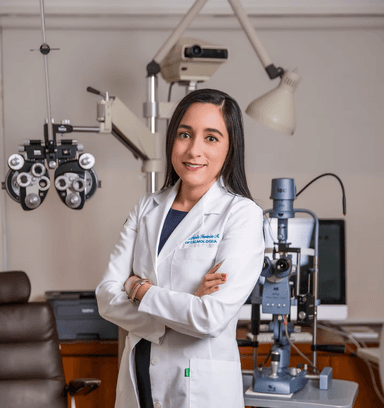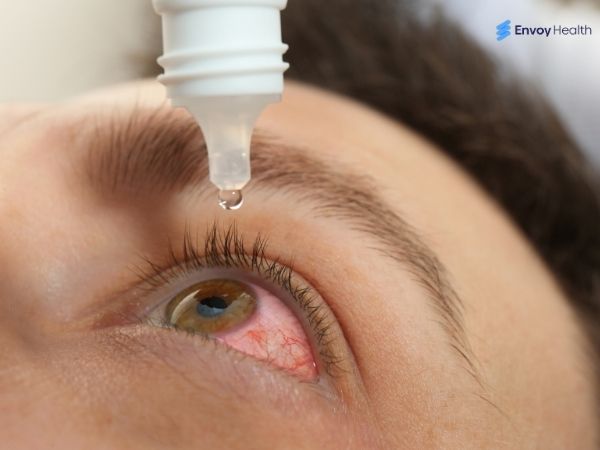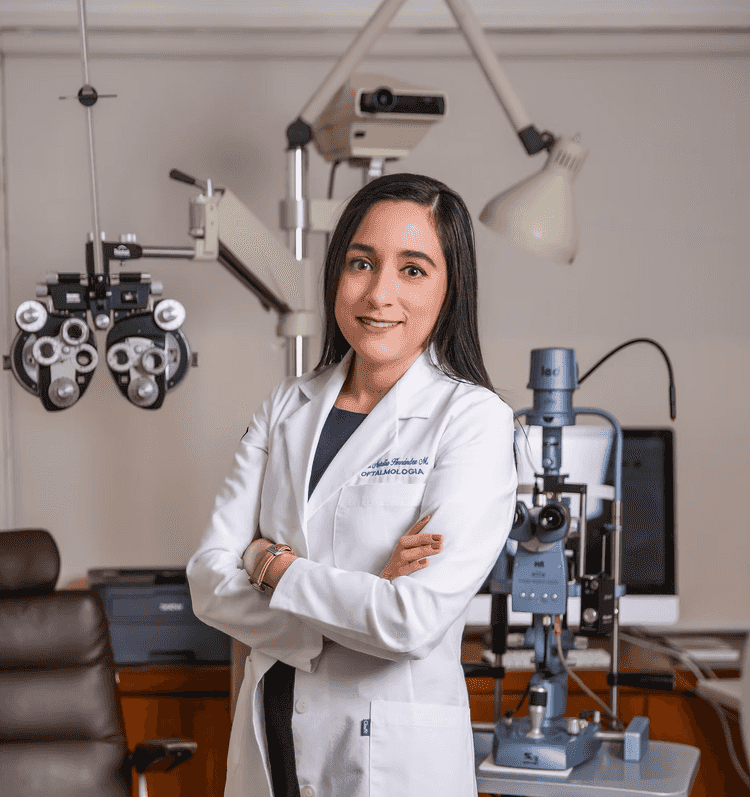Can You Fly After Laser Eye Surgery? Expert Advice Inside

Prathyusha Itikarlapalli
- Content Writer

Dr. Natalia Hernandez Martinez
- Reviewed by

Key Takeaways
- Flying too soon after laser eye surgery can worsen dryness and irritation; give your eyes enough time to heal before booking a flight.
- The safe time to fly varies by procedure. LASIK patients may travel within a few days, while PRK or retinal surgeries require longer recovery and medical clearance.
- Before flying, always get your ophthalmologist’s approval and prepare with essential eye care: use lubricating drops, stay hydrated, and protect your eyes from cabin air and glare.
Laser Eye Surgeries and Recovery
Laser eye surgeries reshape the cornea in order to deliver clear vision. Ophthalmologists consider them for the treatment of nearsightedness, farsightedness, and astigmatism. Depending on the underlying eye problems, common laser eye surgeries include LASIK (Laser In-Situ Keratomileusis), PRK (Photo Refractive Keratectomy), LASEK (Laser Subepithelial Keratomileusis), and SMILE (Small Incision Lenticule Extraction).
Can You Travel After Laser Eye Surgery Back Home Without Issues?
Yes, you can travel back home after laser eye surgery. Most laser eye surgical procedures take 20-30 minutes to complete, with the entire appointment lasting 1-2 hours. You will be able to see clearly, and can return home the same day after surgery. However, remember to have a friend or family member to drive you home safely. Although you will see clearly the same day, self-driving should be avoided. Because occasional blurry vision, itching, and dryness can occur, driving alone can be risky. Further, in some regions, you must also meet certain legal vision requirements before getting back behind the wheel. So it's better that you get a professional approval with an ophthalmologist follow-up before driving by yourself. However, you can continue leading a routine life while avoiding strenuous tasks. But getting back to normal, many patients ask us, “Can you fly after eye surgery?” While there are many myths and presumptions around this, we will detail the facts in the upcoming section.
Can You Fly After Laser Eye Surgery?
Flying immediately after laser eye surgery is typically not advised by eye surgeons. In short, flying is generally not a problem. The real problem is handling the symptoms of dryness and itching. You will need your ophthalmologist's clearance before planning your travel. They will give you an official go-ahead to fly by checking your eyes and confirming if they are healing properly. More importantly, laser eye surgery is an umbrella term, and the individual procedures vary significantly. Below, we address the most frequently asked questions in this regard.
Can You Fly After PRK Surgery?
It's better to wait at least 3-5 days before flying after the laser PRK surgery. While some recommend waiting until one week, the exact time frame depends on the healing. PRK (Photorefractive Keratectomy) involves removing the external layer of the cornea, followed by reshaping the inner layers with excimer lasers. The outer epithelial layer of the cornea should regrow during the initial recovery. International travel by plane during this period can increase dryness and itching, and it is therefore advised to be avoided.
Can You Fly After Laser Cataract Surgery?
Laser cataract surgery is simple, but flying early after surgery is generally not recommended. Not because it hurts recovery, but because it can increase discomfort. It's better to have your eyes checked by an ophthalmologist before planning your trip.
Can You Fly After LASIK Eye Surgery?
Most patients fly within 24-48 hours after LASIK eye surgery, provided your ophthalmologist confirms that healing is progressing effectively. Although the corneal flap adheres almost immediately after surgery, increased discomfort from dryness can occur. It's better to follow the eye surgeon's instructions before planning your travel.
Can You Fly After Laser Eye Surgery for Glaucoma?
Yes, you can safely fly after glaucoma laser surgery, provided your ophthalmologist approves it. You may worry that external pressure changes could affect the eye’s internal pressure. But the underlying fact is different. While laser glaucoma surgery creates a natural system for fluid drainage, cabin pressure during a flight is typically controlled. So this external pressure does not disturb the soft healing eye tissues. However, candidates are likely to experience dryness and itching due to the prevailing low humidity.
Can You Fly After SMILE Eye Surgery?
You can fly after SMILE eye surgery, provided the flight time is short and you take proper precautions, such as using lubricating eyedrops. However, you should wait 5-6 days after SMILE eye surgery before taking a long flight.
Can You Fly After Laser Surgery for Retinal Tear?
The choice of flying after laser surgery for a retinal tear depends on the extent of the surgery. You can take a flight with the eye doctor's approval if the surgery for a retinal tear is simply to seal the tear. On the other hand, flying after retinal tear surgery involving a gas bubble should be strictly avoided. The retinal detachment surgery involves a gas bubble to hold the retina in place. This is gradually absorbed during healing, and flying before complete healing can cause it to expand even from the slightest pressure changes in the cabin. In some cases, it can even lead to blindness.
Why Can’t You Fly After Laser Eye Surgery?
The surgical lasers used to perform the most intricate eye treatments create a corneal flap that should heal after the procedure. The creation of the corneal flap disrupts the nerves necessary for tear production. So, you’re more likely to experience dryness and irritation during the early recovery after laser eye surgeries. Beyond this, the air circulating in the aeroplane cabins is drawn from the exterior, and it is nearly devoid of moisture. So, flying early after laser eye surgery can worsen dryness, making it uncomfortable for patients, especially on long-haul flights.
Studies suggest that proper reattachment of the flap is crucial, as slippage or dislocation can lead to complications.[1] Disruption of the tear film and nerves sensing the response leads to less moisture. More importantly, prolonged periods of dryness, itching, and irritation can be frustrating, slow down the healing process. And any neglect of eye rubbing can dislodge the cornea. This necessitates the surgical repositioning procedures to prevent long-term complications.[2]

How Soon Can You Fly After Laser Eye Surgery?
The time frame for flying after laser eye surgery treatment depends on the type of surgery and the case-specific risk factors. You can generally take short-duration flights within 24-48 hours after the LASIK eye surgery. However, it's better to wait 3-4 days if it's SMILE, LASEK, PRK, or glaucoma surgery. But you are strictly required to wait at least a week, or until the gas bubble is absorbed and complete healing occurs, if it's the surgery to treat retinal detachment with a gas bubble.
Note that traveling before the incisions heal or neglecting prescribed eyedrops can pose severe risks. It can range from necessitating repeated procedures or even blindness. It's always best to consult your ophthalmologist before making travel plans.
Your ophthalmologist will monitor the healing process and check for any post-surgical complications. Generally, older patients or those suffering from uncontrolled diabetes, rheumatoid arthritis, or lupus experience risks of delayed healing. Any of the conditions can extend the waiting period.
How Is Healing After Laser Eye Surgery?
After laser eye surgery, your cornea should reposition itself. The corneal epithelial and stromal cells regenerate, and collagen remodels during the initial healing. For procedures such as PRK or LASEK, where a portion of the cornea is removed, new cells regenerate. The lasers cut the tear film and nerves associated with tear production during laser eye surgery. This is the reason behind the symptoms of dryness, itching, and eye irritation during the early days after surgery. However, these symptoms subside as the incisions heal and new tissue regenerates. Proper aftercare is crucial at this stage.
Tips To Fly Comfortably After Laser Eye Treatment
Get your eye surgeon's approval before planning your air travel after laser eye treatment. Pack all the essential supplies and prescribed medications in the hand luggage. This will help you enjoy a comfortable and peaceful flight. Below are tips for dealing with dry air on short-duration flights after laser eye surgery.
- Use artificial tears as recommended to avoid irritation and itching.
- Stay hydrated before, during, and after your flight.
- Avoid touching or rubbing your eyes before, during, and after a flight, as this can increase the risk of infection or delay healing.
- Wear protective eyewear or sunglasses on your way to the airport and on the plane. This not only protects sensitive tissues from foreign particles but also reduces eye strain and glare-related discomfort.
- Limit screen time and give your eyes adequate rest.

Busting the Common Misconceptions About Flying After Laser Eye Treatment
Here, we provide expert answers for some common myths about flying after laser eye treatment. Check out the table below to avoid confusion.
Misconception |
Fact |
|
I can fly if I can see clearly after laser eye surgery. |
No, you will need your ophthalmologist's approval before flying after laser eye surgery. |
|
Using artificial tears once before a flight is enough. |
No, air cabins are less humid, so you should use artificial tears as prescribed. |
|
Short flights do not affect the recovery. |
No, recovery does not depend on the flight duration. It depends on the surgical procedure and underlying eye conditions. |
|
Wearing sunglasses on a plane is unnecessary. |
No, you should wear sunglasses or protective eyewear to shield your eyes from dust and glare. |
Final Word!
Flying after laser eye surgery procedure is generally safe. But the right timing and proper aftercare make all the difference. Most patients can travel within a few days, but your exact timeline depends on the type of procedure, your recovery rate, and your ophthalmologist’s clearance. Always attend your follow-up visits, keep your eyes well-hydrated, and avoid unnecessary strain during travel.
Remember, seeing clearly doesn’t always mean your eyes are fully healed. Giving your vision the care and rest it needs ensures long-term results and a comfortable journey ahead.
If you’re planning treatment abroad and want expert guidance every step of the way, from surgery to safe travel. Sign up with Envoy Health. We help you connect with trusted specialists and plan your post-surgery recovery with confidence.
References
Disclaimer
The information in this article is for educational purposes only and does not replace medical advice. Always consult your doctor before starting any treatments.
You can fly between 24-48 hours after laser cataract surgery. While you can see clearly early after cataract surgery, you should get the first post-op check-up before flying. Using the prescribed artificial tears regularly and staying hydrated will help you manage discomfort.
The time frame for when you can fly after eye surgery depends on the type of surgical procedure you undergo. Typically, you can fly between 24-48 hours after undergoing cataract surgery or LASIK. But for PRK or SMILE, you should wait 3-4 days; for retinal detachment surgery, you should wait at least a week before flying.
Flying after an eye injection is generally not recommended. It's always recommended to wait for at least a week after getting an eye injection, especially if it involves injecting a gas bubble.
It’s best to wait a few days before going on a holiday after laser eye surgery. Always get your doctor’s approval and follow certain precautions before planning any trip. Traveling too soon can expose your eyes to dust, dryness, or infection risks, especially in unfamiliar environments. For instance, international travel after LASIK can usually be planned within a week, provided your ophthalmologist confirms that healing is complete. However, for other procedures like PRK or SMILE, you may need to wait a bit longer. Protecting your eyes from sunlight, dry air, and irritants will ensure your recovery stays on track while you enjoy your time away.
Flying after retinal laser surgery depends on the surgical method. Generally, ophthalmologists inject a gas bubble or silicone oil into the eye during retinal detachment surgery. There are no restrictions on flying if silicone oil is injected into the eye. However, you should wait for one week if a gas bubble is injected. It's because the cabin pressure can cause it to expand and lead to serious consequences, such as vision loss.
So, we partner with the premier healthcare facilities!
Send me the list
